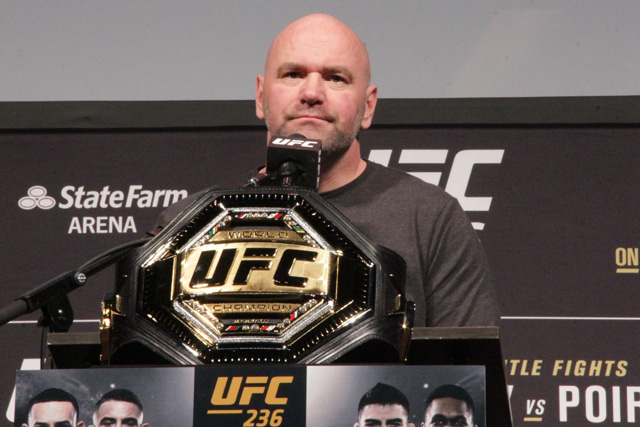
Editor’s note: The views and opinions expressed below are those of the author and do not necessarily reflect the views of Sherdog.com, its affiliates and sponsors or its parent company, Evolve Media.
There are three types of fighting: fighting for entertainment, fighting for sport and fighting for one’s life. The latter was present to a small degree in early no-holds-barred competitions in the 1990s, when some of the grittier matches—where there were no rounds and anything went (even head butts and groin strikes) except eye gouges for 30-plus minutes of continuous combat—resembled a battle for survival. Those days have long since passed, and modern MMA matches, with the Unified Rules, referees, cageside physicians and athletic commissions, result in fighting for sport and entertainment. What’s the distinction between the two?
“Sport” is whatever allows one to succeed the most under a given series of rules. That includes “boring,” cautious approaches to both striking and grappling—approaches UFC President Dana White absolutely hates, threatening their practitioners with being released from the company, as well as incentivizing their opposites with performance bonuses, among other rewards. Alternatively, we have “entertainment,” which is all about exciting the crowd and making as much money from fighting as possible. It’s the commodification of MMA.
Now, the elements of sport and entertainment are at war with one another. The best “sports” approach is almost always different from the most “entertaining” one. Note that tremendously exciting, highly talented fighters like Vicente Luque, Derrick Lewis and even Justin Gaethje have never been undisputed champions despite getting multiple opportunities. Kamaru Usman was up three rounds to one against Leon Edwards by treating the fight as a sport, but in the final stanza, he treated it too much like entertainment, not wanting the fans to boo or his boss to get angry at him. He paid the price, losing his welterweight crown via knockout.
That brings us neatly to the last two fights at UFC 282. From the standpoint of sport, Jared Gordon clearly defeated Paddy Pimblett. Of the 25 media members, 24 had it scored for Gordon. However, as noted, the Ultimate Fighting Championship is overwhelmingly an entertainment product. Pimblett is one of its biggest stars—a huge moneymaker now and for years to come. What is Gordon to the company? A disposable body to fill up a card. That seems quite harsh, but it’s exactly how the corporate UFC sees him. Thus, it came as no surprise to me that all three cageside judges had it scored for Pimblett. If you believe it’s random, consider that one out of 25, or 4% of the media, had it for Pimblett. If that’s a representative sample, then the chances of all three cageside judges having it for Pimblett was one in 15,625. While that’s far more likely than winning the lottery, 15,625 is still more than twice the total number of UFC fights across its nearly 30-year history. Again, though, you simply need the proper framing here. Once you realize that MMA in the UFC is at least as much entertainment as it is sport, it makes perfect sense. It’s the same reason Sean O’Malley won an even more despicable robbery against Petr Yan. O’Malley is the bigger star, and the prospect of his facing Aljamain Sterling was more appealing than Yan facing Sterling for a third time. These awful decisions involving big stars only ever err in one direction, and it’s towards the money. Look at pro boxing for decades and decades of examples if you still have doubts.
Then, we have the main event. From the standpoint of “sport,” Magomed Ankalaev’s performance was extraordinary. With a badly damaged leg making it impossible for him to push off effectively and throw hard punches, let alone kicks, and being visibly hurt and limping, Ankalaev mastered the tremendous pressure he was under, switched gears and found a brilliant path to victory through dominant grappling despite primarily being a striker. It was one of the grittiest and most unexpected performances I’ve ever seen in a championship match, with Ankalaev, a -350 pre-fight favorite, slipping to a +215 underdog and then recovering to a -455 favorite before the final round—a stanza where he brutalized Jan Blachowicz with ground-and-pound to such an extent that two judges scored it 10-8.
From the standpoint of “entertainment,” it was a relative bust. White made this all too clear at the post-fight press conference when he announced that the next event for the vacant title would pit Glover Teixeira against Jamahal Hill, two completely different fighters. What about Ankalaev and Blachowicz? Who cares? This is primarily entertainment, not sport. In a sport, Blachowicz and Ankalaev would rematch one another for the vacant title. In an entertainment spectacle, just grab two random contenders who will maximize the live gate and pay-per-view buys.
I’m not even criticizing the UFC here, because this approach works. I saw plenty of people immediately forget their disappointment over the anti-climactic Ankalaev-Blachowicz draw and get hyped for the prospect of an exciting battle between Teixeira and Hill. Most don’t care about the sanctity of sport, and the UFC is there to cater to that. For the sake of honesty, stop referring to what the UFC is presenting as a “sport.” Stop thinking there is going to be any fairness or objectivity from judges when a huge star faces an interchangeable cog in the machine. Stop worrying about the UFC rankings and who truly deserves a title shot. It’s all about entertainment and maximizing dollars. The sport aspect is secondary.

